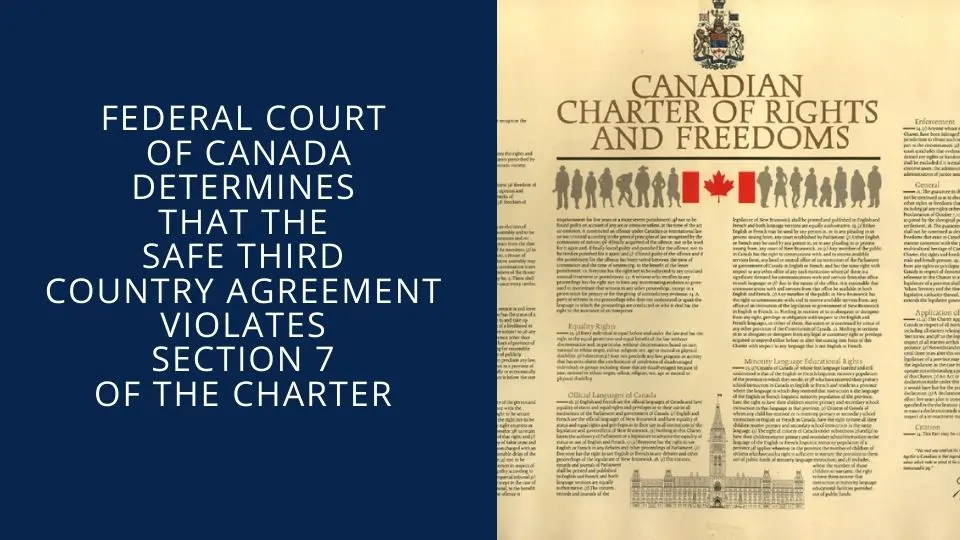On July 22, 2020, the Federal Court of Canada determined in Canadian Council for Refugees v. Canada (Immigration, Refugees and citizenship), 2020 FC 770, that the provisions enacting the Safe Third Country Agreement infringe the guarantees and rights that are in section 7 of the Charter.
On April 15, 2021, the Federal Court of Appeal determined in Canada (Citizenship and Immigration) et al. v. The Canadian Council for Refugees et al., 2020 FCA 181 that the provisions enacting the Safe Third Country agreement are valid and that they do not infringe any charter rights.
What is the section 7 of the Charter?
Section 7 of the Charter provides that “Everyone has the right to life, liberty, and security of the person and the right not be deprived thereof except in accordance with the principles of fundamental justice
“.
What is the Safe Third Country Agreement?
The Safe Third Country Agreement is given effect by s. 101(1)(e) of the Immigration and Refugee Protection Act, SC 2001 c 27(IRPA), and by s. 159.3 of the Immigration and Refugee Protection Regulations SOR/2002-227 (IRPR or the Regulations) which designated the US a “safe third country”.
The Safe Third Country Agreement operates by deeming those who arrive at a Canada land Port of Entry from the United States as ineligible to make a refugee claim in Canada unless one of the exceptions to the Safe Third Country Agreement applied.
What did the Federal Court determine regarding the Safe Third Country Agreement and section 7 of the Charter?
The Court determined that the provisions that relate to the Safe Third Country Agreement which are s. 101(1)(e) of the Immigration and Refugee Protection Act and R. 159.3 of the Regulations t are of no force or effect pursuant to section 52 of the Constitution Act, 1982, because they violate s. 7 of the Charter. Although, the declaration of invalidity is to be suspended for a period of 6 months from the date of the decision.
The Court determined that the evidence clearly demonstrated that those who tried to claim refugee protection in Canada by entering from the United States were being returned to the US by Canadian officials, through the application of the Safe Third Country Agreement, were being detained as a penalty for trying to claim refugee protection in Canada.
What did the Federal Court of Appeal Determine regarding the Safe third country agreement?
The Federal Court of Appeal determined that the Charter challenge was not properly constituted in light of the sections of the legislation that was being challenged. The claimant had only challenged paragraph 101(1)(e) of the Act and section 159.3 of the Regulations. The Court believed that the Claimants had not challenged subsection 102(3) which played a pivotal role in ensuring the continued designation under the Safe Third Country Agreement.
The Court also determined that the Federal Court had erred in determining that returnees to the United States are “immediately and automatically imprisoned by U.S. authorities
, that safety valves were not “generally available”
and, therefore, were “illusory”
and that findings that detention conditions in the U.S. are cruel and unusual and cause psychological suffering.
The FCA determined that there was no evidence that could support a finding that the treatment of returnees to the United States at the Canada-United States border “shocks the conscience”
and ineligibility to the Refugee Protection Division for refugee claimants arriving from the United States, is not disproportionate with the objective of sharing responsibility for the consideration of refugee claims with countries that are signatory to and comply with the relevant articles of the Conventions and have an acceptable human rights record.
This decision is significant because this means that the Safe Third Country Agreement has been reinstated subject to any subsequent decision or judgment rendered by a higher Court (Supreme Court of Canada) or if the legislation is amended.

